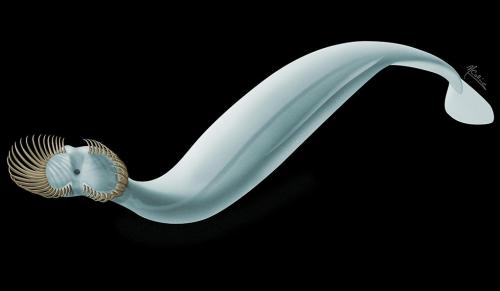
August 9, 2017
Scientists have identified a small marine predator that once patrolled the ocean floor and grabbed its prey with 50 spines that it deployed from its head.
Named Capinatator praetermissus, it is roughly four inches long and represents a new genus and species. Scientists from Yale University and the Royal Ontario Museum made the identification based on 50 specimens from the fossil-rich Burgess Shale in British Columbia.
“This is the most significant fossil discovery of this group of animals yet made,” said Derek Briggs, Yale’s G. Evelyn Hutchinson Professor of Geology and Geophysics and curator at the Yale Peabody Museum of Natural History. Briggs is lead author of a study published Aug. 3 in Current Biology about the discovery.